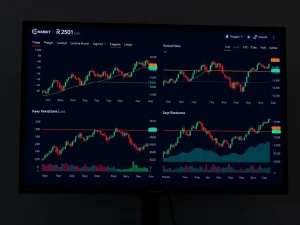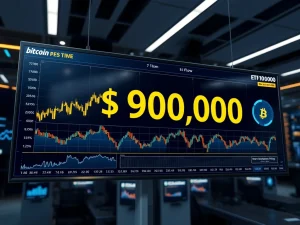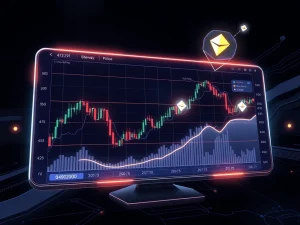Unlocking Value: Franklin Templeton & VeChain Revolutionize Tokenized U.S. Treasuries

For anyone following the pulse of the cryptocurrency and traditional finance worlds, a seismic shift is underway. The lines between established financial institutions and cutting-edge blockchain technology are blurring, creating unprecedented opportunities. A recent groundbreaking announcement highlights this convergence: Franklin Templeton, a titan in asset management, has integrated its BENJI platform with VeChain’s robust blockchain infrastructure. This strategic move aims to facilitate tokenized access to U.S. Treasury securities, a development poised to significantly impact the landscape of Tokenized U.S. Treasuries and institutional finance.
Franklin Templeton and VeChain: A Game-Changing Partnership for Tokenized U.S. Treasuries
On July 25, 2025, Franklin Templeton officially unveiled its collaboration with VeChain, marking a pivotal moment for the adoption of digital assets within regulated financial frameworks. The core of this partnership lies in enabling institutional clients to tokenize and transact in U.S. Treasury bills. This isn’t just about digitizing a document; it’s about creating a liquid, transparent, and efficient system for managing corporate treasury operations.
This initiative builds upon Franklin Templeton’s existing digital asset prowess, particularly its Franklin OnChain U.S. Government Money Fund (FOBXX). With a substantial $780 million under management, FOBXX already tokenizes its shares via the BENJI platform. The integration with VeChain extends this reach, tapping into VeChain’s layer-1 blockchain, renowned for its dual-tokenomics model, which underpins its scalability and security.
The implications for Tokenized U.S. Treasuries are profound. By bringing these stable, low-risk assets onto a blockchain, the partnership directly addresses long-standing inefficiencies in traditional financial systems, such as:
- Cross-border payment delays: Tokenization can significantly reduce settlement times.
- Collateral management complexities: Digital representation simplifies the use of treasuries as collateral.
- Operational friction: Streamlined processes can lower costs and reduce manual errors.
This move is a clear signal of traditional finance’s growing confidence in blockchain’s ability to enhance, rather than disrupt, core financial operations.
Unlocking Institutional Liquidity with Blockchain Efficiency
One of the primary goals of this integration is to enhance Institutional Liquidity. How does tokenization achieve this? By making U.S. Treasury bills accessible on a blockchain, they become more divisible, transferable, and potentially usable in a wider array of decentralized finance (DeFi) applications, all while maintaining regulatory compliance.
Investors can now access tokenized money market funds through VeChain’s infrastructure. This isn’t a wild west scenario; the partnership emphasizes strict adherence to regulatory standards. Key custody and liquidity partners, BitGo and Keyrock, ensure that all transactions and holdings remain compliant, fostering trust among institutional players who prioritize security and regulatory clarity.
The inherent efficiency of blockchain technology plays a crucial role here. VeChain’s enterprise-grade capabilities mean high-value transactions can be processed with speed and transparency. This capability is vital for large institutions dealing with significant capital flows, allowing them to manage their treasury operations with greater agility and insight.
The BENJI Platform: Expanding Reach Through Blockchain Integration
The BENJI platform is at the heart of Franklin Templeton’s digital asset strategy. The Franklin OnChain U.S. Government Money Fund (FOBXX) is the flagship product, with each BENJI token representing a share in FOBXX, maintaining a stable $1 net asset value by investing in U.S. government securities and repurchase agreements.
Before this announcement, FOBXX was already a multi-chain pioneer, accessible across eight blockchain networks including Ethereum, Solana, and Stellar. Stellar currently holds the largest share of BENJI’s market capitalization, exceeding $430 million. The addition of VeChain to this impressive roster underscores Franklin Templeton’s commitment to a diversified liquidity strategy, aiming to attract a broad investor base across various blockchain ecosystems. This expansive Blockchain Integration strategy demonstrates a forward-thinking approach to asset management, recognizing that different blockchains cater to different needs and user bases.
This initiative places Franklin Templeton in direct competition with other major players venturing into tokenized money market funds, such as BlackRock’s BUIDL and Ondo’s OUSG. The competition is fierce, but partnerships like the Franklin Templeton VeChain collaboration are seen by analysts as key accelerators for broader market adoption, despite the inherent challenges like navigating complex regulatory landscapes and overcoming technical hurdles.
Franklin Templeton VeChain Collaboration: Paving the Way for Future Finance
VeChain’s role in this ecosystem is pivotal. This partnership validates VeChain’s enterprise blockchain capabilities in handling high-value, regulated transactions. It strengthens VeChain’s position in a competitive landscape where platforms like Polygon and Ethereum also vie for enterprise clients. This isn’t just a win for VeChain; it’s a testament to the growing acceptance of specialized blockchains for specific enterprise use cases.
Regulatory compliance remains a cornerstone of this collaboration. Both Franklin Templeton and VeChain are committed to adhering to existing financial regulations, ensuring that tokenized treasuries are managed under a robust compliance framework. This emphasis on regulatory alignment is crucial for addressing the concerns of institutional investors, fostering trust and encouraging greater participation in the nascent tokenized asset class.
The success of this integration could influence broader market dynamics, driving the adoption of tokenized assets in corporate finance and shaping the evolution of blockchain infrastructure for institutional use. As this project progresses, stakeholders will closely monitor its impact on Franklin Templeton’s digital asset portfolio and VeChain’s expanding list of enterprise use cases. The Franklin Templeton VeChain partnership exemplifies how blockchain technology can redefine traditional financial workflows, offering a glimpse into a future of secure, transparent, and efficient asset management.
Conclusion
The integration of Franklin Templeton’s BENJI platform with VeChain for tokenized U.S. Treasuries represents a significant leap forward in bridging traditional finance with the blockchain world. This collaboration promises to unlock new levels of institutional liquidity, enhance efficiency in corporate treasury operations, and set new standards for regulatory compliance in the digital asset space. As more financial giants embrace tokenization, the future of finance looks increasingly digital, decentralized, and undeniably exciting.
Frequently Asked Questions (FAQs)
What is the primary goal of the Franklin Templeton and VeChain integration?
The primary goal is to facilitate tokenized access to U.S. Treasury securities for institutional clients, enhancing liquidity and transparency in corporate treasury operations through a regulated framework.
What is the BENJI platform and FOBXX?
BENJI is Franklin Templeton’s platform for digital assets. FOBXX (Franklin OnChain U.S. Government Money Fund) is a $780 million fund that tokenizes its shares via the BENJI platform, investing in U.S. government securities and repurchase agreements.
How does this partnership enhance institutional liquidity?
By tokenizing U.S. Treasury bills on VeChain’s blockchain, the assets become more divisible, transferable, and efficient for use in cross-border payments and collateral management, thereby increasing their liquidity for institutions.
Which other blockchain networks does FOBXX currently support?
Before integrating with VeChain, FOBXX was already accessible across eight blockchain networks, including Ethereum, Solana, and Stellar, with Stellar holding the largest share of BENJI’s market capitalization.
What role do BitGo and Keyrock play in this integration?
BitGo and Keyrock serve as custody and liquidity partners, ensuring that the tokenized money market funds accessible through VeChain’s infrastructure comply with all necessary regulatory standards.
How does this initiative compare to other tokenized fund offerings?
Franklin Templeton’s initiative competes with similar offerings from major players like BlackRock’s BUIDL and Ondo’s OUSG, all aiming to digitize traditional financial instruments like money market funds.









